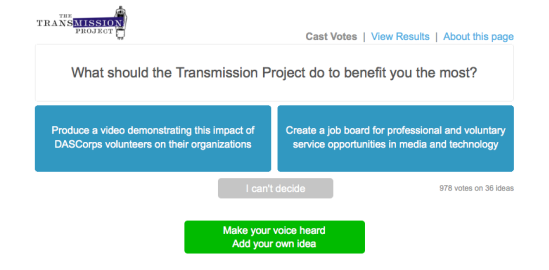evaluation
Feedback Process Inspires Surge of Support

Two weeks ago the Transmission Project began soliciting feedback from its allies and partner organizations regarding what specific projects we can do over the next few months to help assure our legacy remains relevant to your work in the future. We were impressed by the effort you put forth.
Honest Practice: How the Public Sector Can Look at Itself (New article in Resources)

We provide here a detailed summary of the article “Honest Practice: How the Public Sector Can Look at Itself” by Howie Fisher with illustrations and design by Billy Brown. Download the full pdf from attachments.
Honest Practice: How the Public Sector Can Look at Itself
An article about the pitfalls of subscribing to so-called best practices. An alternative is offered in the form of Honest Practice: a narrative approach to evaluation that contests the copy-and-paste mentality that plagues our field.
Written by Howie Fisher with illustrations and design by Billy Brown
Outreach Documentation Blog
Corps member Goda Trakumaite describes her Outreach Documentation Blog: “I keep a detailed record of every outreach event I do on this password protected blog accessible to the whole office. Along with some photos documenting the event and a reflection of how it went, who attended, what worked and what did not work, I upload all materials that were either used for or produced during the event. That way anyone can replicate a particular presentation while also making the changes that I might suggest making in the reflections.
SWOT Analysis
A SWOT (Strengths, Weaknesses, Opportunities, Threats) analysis corps member Ericha Hager conducted at each of the stations participating in the NorCal Regional Collaborative to identify the best points of collaboration within the group. Ericha conducted individual interviews with staff members at each station (and in some cases, group discussions) and compiled a SWOT analysis focusing on the four areas of emphasis within the collaborative (production; education/youth media; fundraising; technology).
Outreach Coordinator
The CTC AmeriCorps member will support our ongoing outreach and community development efforts. Meegan will work on a number of projects including: computer/internet digital literacy outreach, revitalize latino website, public outreach and education on media issues, and project assistance for MAIN
- recruit volunteers and service providers
- Project Coordination
- Public Speaking
- Write press releases
- Fundraising assistance
- Organize task forces/coalitions
- Conduct outreach
- Volunteer coordination
- Website administration
- Write training curricula; Train trainers
- Grant writing and research
- Database management
- Design brochures, posters
- Develop community partnerships
- Assist in project evaluation
Marketing and Outreach Coordinator
- Lead community outreach and marketing efforts
- Hold information sessions about NTRC Programs and Services
- Develop our database, track client information
- Create surveys and evaluations for users to evaluate NTRC programs
- Coordinate community groups and leaders and hold meetings including users, stakeholders, and other community members on issues related to the NTRC projects
- Market NTRC programs and services to partner organizations, Service Connectors and Housing Developments
- Create publications, press releases and newspaper articles
Event Planning
- Increase attendance at CTOC events
- Help coordinate CTOC events
- Assist in the development of a training curriculum for Train the Trainer events
- Assist in evaluation of CTOC’s project activities
- Assist in fund raising efforts
Outreach and Volunteer Coordinator
Victoria was responsible for developing a new co-op model for building capacity in CTC’s, collaborating with partner agency to address hardware and software needs, recruiting volunteers to sustain co-op members and new VISTA’s for the project, conducting community relations and exhibiting at events, and developing conferences for the community technology field. CTI used its previous mapping of CTC’s to target seven organizations to support through the co-op. Victoria conducted TechAtlas assessments for each organization and used these sophisticated assessment tools to determine how to allocate different resources. These accounts identified technical weaknesses in each CTC through the basic assessments, and also illustrated the technical, staffing and funding nuts and bolts behind running a CTC for program directors. This information was given to the program directors, and after the initial assessment CTI helped develop a comprehensive Technology Plan of Action based around Tech Atlas recommendations and the CTC’s own mission statement and priorities. Victoria recruited volunteers to deal with specific problems that Tech Atlas had identified.
Two conferences were organized to serve the funding, advocacy, and planning needs of nonprofit technology organizations (Jan. and June 08). The conferences established a platform for joint advocacy and inter-agency relations for nonprofits, positioning them in relation to the Donor’s Forum, Knight Foundation, and related initiatives such as OneCommunity and Florida 2.0. Through the conferences and community relations, positive relations were established and maintained with key partners such as InternetCoast, OneCommunity, and Florida 2.0. Through the co-op Victoria helped to establish a new CTC lab (Hialeah Gardens), strengthen existing programs, increase communication and collaboration between participants. Assessments were conducted with Crossfire, Cutler Bay Parks and Recreation, Inner City Youth, Center for Independent Living, WeCount (Cutler Bay), WeCount (Homestead) and the North Miami Beach Intel Clubhouse. Volunteers were recruited through Refresh Miami meetings and various online sources, and the first volunteer orientation took place in June 08. These activities were the culmination of planning and outreach that began in November 07, when the co-op strategy was initially developed. As a result of positive progress on these fronts, Victoria was hired by Collins Center to work jointly with the initiative and with InternetCoast.
CTC’s expressed appreciation and volunteered to write support letters for the project. Key partners likewise expressed appreciation for the work of the project and have made plans for ongoing collaboration. The most illustrative story is that InternetCoast asked Victoria if she would be willing to coordinate their own program activities, and together we developed a jointly funded position for 2008-09 that will enable Victoria to coordinate the work of nonprofit and for-profit technology sectors, and to better develop linkages between the two.
Community Organizing and Disability Awareness
The focus of Rayna’s work was to help organize a committee of people with disabilities, staff from public and non-profit agencies that serve them, and community volunteers to carry out the North Quabbin TechACCESS project (funded via CTCNet’s C4All program). Her goal was to build the capacity of the committee to make YES’ facilities, materials, programs and services more accessible and, next, to assist other community organizations and institutions to do the same. Specifically, her job was to:
1) assist with committee recruitment and operations;
2) conduct a community accessibility needs assessment;
3) organize committee training sessions and skill-development activities;
4) assist with research, purchase and installation of equipment, fixtures and technologies;
5) assist with research, preparation and production of accessible program materials;
6) promote the use of the newly-accessible facility, services and programs; and
7) document these activities and evaluate their outcomes.
Rayna assembled a volunteer committee of 12 residents, caregivers and professionals following two information sessions. With the the TechACCESS committee, Rayna conducted a needs assessment, entitled ‘Disability and Opportunity in the North Quabbin’, to identify the demographics of the disabled in our community and their needs. She organized two full days of accessibility trainings with Russ Holland of ATA for committee members and the public (‘Accessible Materials, Websites, Communication’; ‘Reaching Out & Including People with Disabilities’; ‘Accessible Facilities & Programs’; and ‘Accessible Computer Hardware & Software’). With knowledge gained from the workshops, the committee and staff worked with contractors and volunteers to remove physical barriers to YES facilities (bathroom grab bars, motion-activated light switches, lowered soap and towel dispensers, accessible sink faucets and doors handles); entryways (automatic door opener and entryway at sidewalk level); signage (neon signs, lit exit signs); classroom and cyber cafe (foldable, moveable tables and chairs); and computers (assistive hardware and software). Rayna worked with a disabled YES member to create an on-line resource directory for people with disabilities living and working in our region (including a list of businesses indicating which ones are wheelchair accessible, compiled after a telephone poll). Prior to Rayna’s early exit in January due to a medical condition, she attended an information session on the Town of Orange’s annual Community Development Block Grant program. She crafted a concept paper for the next phase of TechACCESS, which is to provide direct services beginning in mid-2008, building on the organizational capacity developed in 2007. Services include providing individualized career, educational and technological assessment, training, and support combined with and group classes to prepare up to 50 teens and young adults for economic self-sufficiency, with assistive technology playing a central role. On the strength of the concept paper, YES was invited to submit a proposal due in October and a full proposal due in November. TechACCESS-Orange was selected by the Town as its only social service project included in a $1M grant application to the MA Department of Housing and Community Development. If successful, the project will receive a $30,000 grant in early fall to support the program through December 2009. The TechACCESS committee members all wrote letters of support specifying the value of and need for the program, and continue to meet monthly.

![[node-title]](../../sites/transmissionproject.org/files/imagecache/resource-thumbnail/resources/thumbs/stinkyDude.jpg)
![[node-title]](../../sites/transmissionproject.org/files/imagecache/resource-thumbnail/resources/thumbs/Goda_blog.png)
![[node-title]](../../sites/transmissionproject.org/files/imagecache/resource-thumbnail/resources/thumbs/SWOT.jpg)